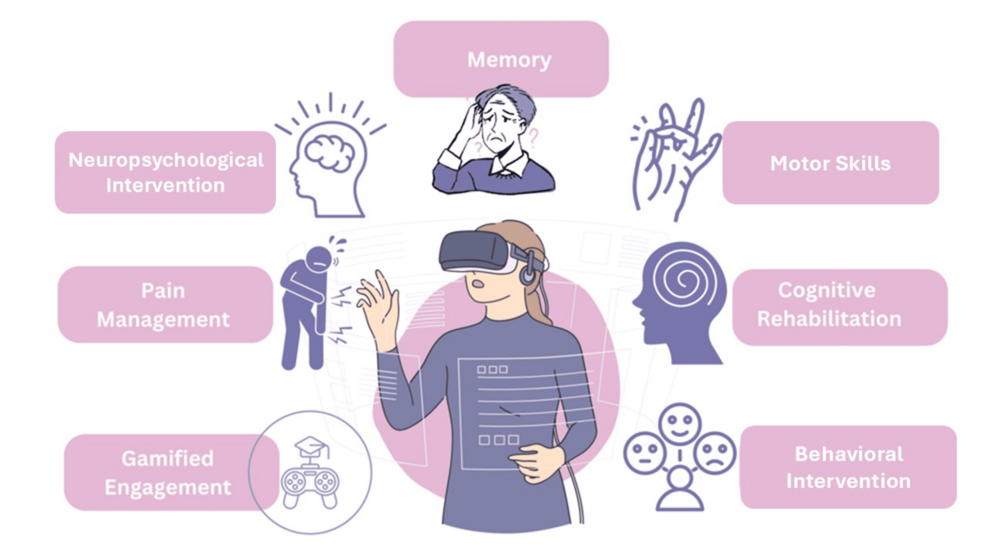Survivors don't need promises and hope, they need ACTUAL 100% RECOVERY PROTOCOLS! When the hell will you start to deliver them? 50 years from now?
Extended Reality in Revolutionizing Neurological Disease: A New Era for Chronic Condition Treatment
Published: August 23, 2024
DOI: 10.7759/cureus.67633
Cite this article as: V H, PK M, MG R (August 23, 2024) Extended Reality in Revolutionizing Neurological Disease: A New Era for Chronic Condition Treatment. Cureus 16(8): e67633. doi:10.7759/cureus.67633
Abstract
Extended reality (XR), which includes virtual reality (VR), augmented reality (AR), and mixed reality (MR), provides promising advancements in managing chronic neurological disorders such as Parkinson's disease (PD), multiple sclerosis (MS), Alzheimer's disease, and stroke. This review examines the impact of XR technologies on neurological care, highlighting their ability to create immersive, interactive environments that enhance rehabilitation through tailored motor and cognitive exercises. XR supports neuroplasticity by providing engaging, contextually relevant exercises and real-time feedback, offering innovative alternatives to traditional methods. The technical issues, clinical validation, and accessibility must be addressed despite the potential benefits. Future developments should focus on refining XR applications, integrating them with complementary technologies, and establishing robust policies to guide their effective and ethical use. XR is poised to revolutionize neurological rehabilitation, promising improved patient outcomes and transforming medical training.
Introduction & Background
According to the World Health Organization (WHO), neurological disorders have a profound impact on nearly one billion people worldwide. This extensive category encompasses conditions such as seizures, Alzheimer's, stroke, migraines, brain injury, multiple sclerosis (MS), and Parkinson's disease (PD). Approximately 50 million individuals are affected by epilepsy, while an additional 24 million are affected by Alzheimer's and other dementias. These disorders do not discriminate and influence people across all nations, irrespective of their age, gender, education, or socioeconomic status, contributing to an estimated 6.8 million fatalities annually [1]. These problems are caused by a variety of factors, including head injuries, strokes, and neurodegenerative diseases, including PD and MS [2]. As the global population ages, the prevalence of neurological disorders increases. However, advancements in medical research are offering new hope for those affected by conditions such as Alzheimer's, PD, and MS [3].
Treating neurological disorders often requires complex, long-term
drug therapies to alleviate symptoms and slow disease progression. While
traditional treatments, such as medications, gene therapies, and stem
cell research, have shown promise, they can be tedious, leading to a
loss of motivation and a decline in patient outlook on rehabilitation [2].
New technologies, including assistive devices, communication aids, and
home automation systems, are being developed to help those with
neurological problems live more independently. However, there is no
one-size-fits-all approach to treating neurological conditions, as each
patient's situation is unique [3].(Well, you blithering idiots, FIND THE COMMONALITIES! My directors would have me fired for such lazy excuses!)
In recent years, extended reality (XR) technologies, encompassing virtual reality (VR), augmented reality (AR), and mixed reality (MR), have emerged as promising tools in neurological care. XR technologies differ from traditional therapies by offering immersive, sensory-rich environments that provide real-time feedback, enhancing therapeutic engagement and outcomes [4,5]. For example, VR is increasingly recognized for its role in cognitive research, evaluation, and rehabilitation. It allows patients to engage in realistic activities and receive precise performance measurements in a safe, controlled setting (Figure 1). Given the limitations of traditional treatments and the unique benefits XR technologies offer, this narrative review explores its potential, current applications, limitations, and future directions of XR technologies in managing chronic neurological conditions. In examining how XR can complement or enhance traditional therapies, this review aims to shed light on the evolving landscape of neurological rehabilitation and care.

No comments:
Post a Comment